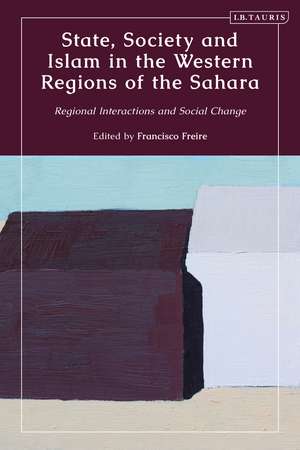State, Society and Islam in the Western Regions of the Sahara: Regional Interactions and Social Change
Editat de Francisco Freireen Limba Engleză Paperback – 21 feb 2024
| Toate formatele și edițiile | Preț | Express |
|---|---|---|
| Paperback (1) | 195.04 lei 6-8 săpt. | |
| Bloomsbury Publishing – 21 feb 2024 | 195.04 lei 6-8 săpt. | |
| Hardback (1) | 543.18 lei 6-8 săpt. | +119.19 lei 4-10 zile |
| Bloomsbury Publishing – 24 aug 2022 | 543.18 lei 6-8 săpt. | +119.19 lei 4-10 zile |
Preț: 195.04 lei
Preț vechi: 251.36 lei
-22% Nou
Puncte Express: 293
Preț estimativ în valută:
37.33€ • 38.56$ • 31.06£
37.33€ • 38.56$ • 31.06£
Carte tipărită la comandă
Livrare economică 25 martie-08 aprilie
Preluare comenzi: 021 569.72.76
Specificații
ISBN-13: 9780755643486
ISBN-10: 0755643488
Pagini: 374
Dimensiuni: 156 x 234 x 25 mm
Greutate: 0.53 kg
Editura: Bloomsbury Publishing
Colecția I.B.Tauris
Locul publicării:London, United Kingdom
ISBN-10: 0755643488
Pagini: 374
Dimensiuni: 156 x 234 x 25 mm
Greutate: 0.53 kg
Editura: Bloomsbury Publishing
Colecția I.B.Tauris
Locul publicării:London, United Kingdom
Caracteristici
Focuses on the political and social experiences of the western Saharan hassaniyya Arabic speaking populations, but outside of a sole focus on the Western Sahara conflict which has dominated existing research
Notă biografică
Francisco Freire is Assistant Professor of Anthropology at the NOVA School of Social Sciences and Humanities in Lisbon, Portugal, and Researcher at The Centre for Research in Anthropology (CRIA), Lisbon, Portugal. He is the author of many articles and book chapters on Islam and the Sahara, including contributions to the Journal of North African Studies, African Studies Review, History and Anthropology and Journal of Modern African Studies.
Cuprins
Preface: Benjamin Soares, University of Florida, USA Introduction: Shifting Sands: State, Society and Islam in the Western Regions of the Sahara, Francisco Freire, NOVA FCSH, PortugalPART I: State Chapter 1: A Land of Opportunities: Political Morphologies at the Northwestern Saharan Frontier (1934-1960), Alberto Lopéz Bargados, University of Barcelona, Spain Chapter 2: A Historical Perspective on Legal Practices in Sahrawi Society (1958-2019), Enrique Bengochea Tirado, NOVA FCSH / CRIA, Portugal Chapter 3: Magnitudes of Sahrawi Nomadism throughout Colonialism and Refugeehood, Juan Carlos Gimeno, Autonoma University, Madrid, Spain and Julien Lafontaine Carboni, École Polytechnique Fédérale de Lausanne, SwitzerlandChapter 4: The Flexible Use of Democracy in an Islamic Republic: The Case of the Mauritanian President Abdel Aziz (2009-2019), Elemine Ould Mohamed Baba Moustapha, University of Nouakchott, Mauritania PART II: Society Chapter 5: Artisanal Gold Mining in Mauritania, Moustapha Taleb, NOVA FCSH / CRIA, Portugal Chapter 6: Unsettling Gender and Feminism: Views from Mauritania, Maria Cardeira da Silva, NOVA FCSH, Portugal Chapter 7: Funeral Orations, the Web and Politics: The Online Making of National Heroes in Mauritania and the Western Sahara in Poems and Songs, Sébastien Boulay, Faculté des sciences humaines et sociales de la Sorbonne, Université de Paris, France and Mohamed Meidah, University of Nouakchott, Mauritania Chapter 8: Haratin Activism in Post-Slavery Mauritania: Abolition, Emancipation and the Politics of Identity, David Malluche, University of Bayreuth, Germany PART III: Islam Chapter 9: On the (Body of the) Subject in the Sahara: Mu?ummadhun Fal b. Muttali's Fat? al-?aqq (19th century), Abdel Wedoud Ould Cheikh, Université de Lorraine, FranceChapter 10: The Past and Present of the Ghu?fiyya Sufi Order from the Western Regions of the Sahara, Yahya Ould al-Bara, University of Nouakchott, MauritaniaChapter 11: Islamic Traditional Schooling in a Globalized Context: A Case-Study from the Teisir Mahadra (southwestern Mauritania), Mariem Baba Ahmed, NOVA FCSH / CRIA, Portugal and Zahra Horma, NOVA FCSH / CRIA, Portugal Chapter 12: Islam, Blasphemy, and Realpolitik in Mauritania: The Case of Mohamed Mkhaitir, Francisco Freire, NOVA FCSH, Portugal Postface: Reflections on Research Ethics in Complex Contexts-Navigating Politics, Pragmatics, and Positionality, Leonardo Villálon, University of Florida, USA and Irina Branco da Silva, NOVA FCSH
Recenzii
This splendidly interdisciplinary and engagingly written book is a powerful contribution to a new understanding of Saharan modes of cultural change and continuity. Its brilliantly researched case studies, and insightful Introduction and Postscript, dispel diehard stereotypes of "immemorial" patterns and abrupt ruptures, and disclose innovation and transformational reappropriations of tradition.
